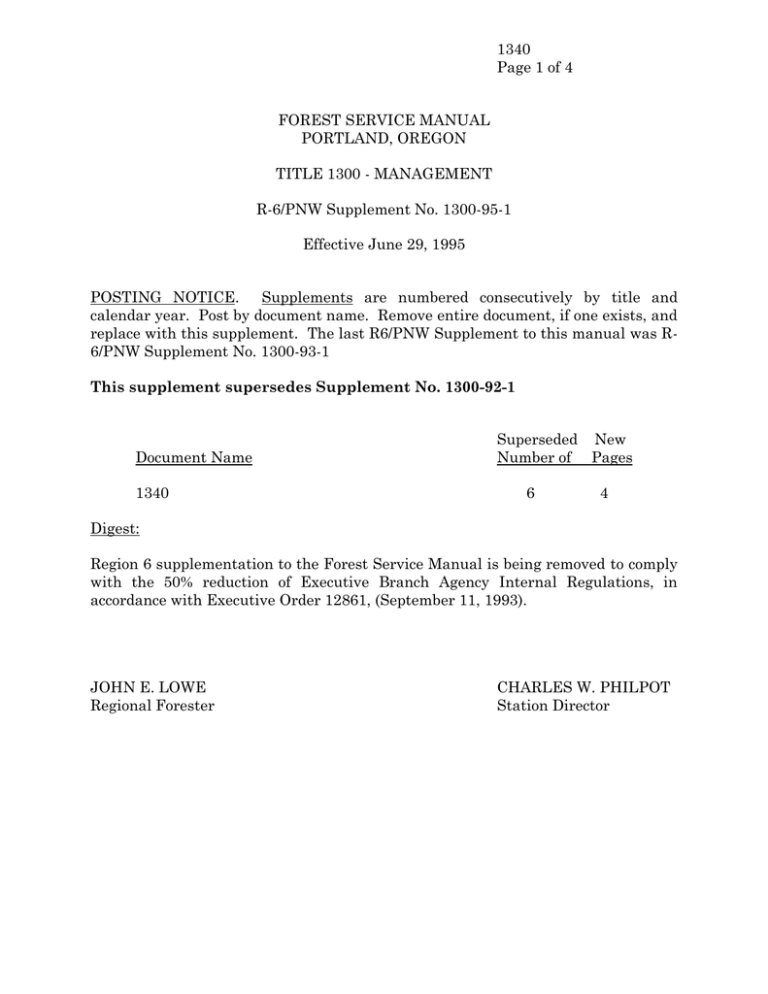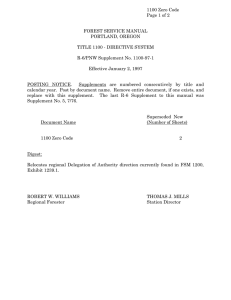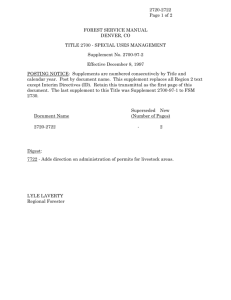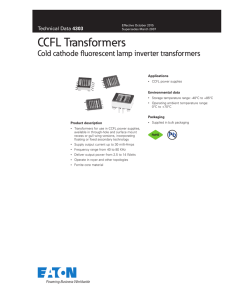1340 Page 1 of 4 FOREST SERVICE MANUAL
advertisement

1340 Page 1 of 4 FOREST SERVICE MANUAL PORTLAND, OREGON TITLE 1300 - MANAGEMENT R-6/PNW Supplement No. 1300-95-1 Effective June 29, 1995 POSTING NOTICE. Supplements are numbered consecutively by title and calendar year. Post by document name. Remove entire document, if one exists, and replace with this supplement. The last R6/PNW Supplement to this manual was R6/PNW Supplement No. 1300-93-1 This supplement supersedes Supplement No. 1300-92-1 Document Name 1340 Superseded New Number of Pages 6 4 Digest: Region 6 supplementation to the Forest Service Manual is being removed to comply with the 50% reduction of Executive Branch Agency Internal Regulations, in accordance with Executive Order 12861, (September 11, 1993). JOHN E. LOWE Regional Forester CHARLES W. PHILPOT Station Director R-6/PNW SUPPLEMENT 1300-95-1 EFFECTIVE 06/29/95 1340 Page 2 of 4 FSM 1300 - MANAGEMENT R-6/PNW SUPPLEMENT 1300-95-1 EFFECTIVE 6/29/95 CHAPTER 1340 - MANAGEMENT IMPROVEMENT ADMINISTRATION 1340.1 - Authority. OMB Circular A-131 (January 1988) and Departmental Regulation DR 5048-1 (July 1989) require Federal Agencies to use Value Analysis approaches to identify and reduce non-essential procurement and program costs. Agency heads are required to establish and improve their use of value analysis programs. 1340.2 - Objective. The objective of Value Analysis is to improve designs for projects and programs by applying a standard process and method of evaluation. Value Analysis provides management with an independent objective technical review of a project or program proposal. 1340.3 - Policy. Value Analysis studies are conducted at the direction of Line Officers or Regional Office Staff Directors. There is no project dollar amount for which a Value Analysis is required. Value Analysis studies may be conducted at any time in the life of a project. However, studies conducted during the development/design phases have the best opportunity at improving cost-toperformance relationships. 1340.4 - Responsibility. Forest Supervisors are delegated the authority to perform value analysis in accordance with this supplement. Studies conducted in compliance with this supplement shall: Follow the full, standard Value Analysis procedures as shown in the Regional Field Guide to Value Analysis. Use teams consisting of four to six people. Use a Value Analysis-trained study team leader with at least half the members having received the basic 40-hour Value Analysis training. Use people who have not been, nor are currently, directly involved with the management, planning, or design of the project being studied. The results of approved studies may become formal staff recommendations. 1. Appropriate Use of Value Analysis. Managers should consider using Value Analysis for projects or programs that are unusually: a. COMPLICATED - Projects with multiple components of a diverse nature and inter-relationships. Examples are projects with many and R-6/PNW SUPPLEMENT 1300-95-1 EFFECTIVE 06/29/95 1340 Page 3 of 4 varied resource issues, other-agency cooperation, or multiple complex design features. b. CONTROVERSIAL - Projects that have a high degree of interest and potentially conflicting resource values or concerns. c. UNIQUE - Projects that have little-used or new/untried conce pts in design. Managers can use Value Analysis in this case to test the design approach for workability and consistency with the primary project function. d. EXPENSIVE - Projects that are high cost. Value Analysis can be used to optimize the value of the relationship between life cycle costs and performance. e. CONCERNING TO MANAGEMENT - Projects that are undefinable as to their concern but are unsettling to management. If management needs or desires a "second opinion" on a given project, Value Analysis can be used very effectively to validate project concepts. f. BROAD IN APPLICATION - Projects that are significant to Regional or National applications. While Value Analysis works best when outputs can be measured and/or costs can be quantified, it is possible to conduct analyses under circumstances of limited quantifiable information. Value Analysis is an appropriate evaluation process for use in the study of projects, programs, organization reviews, or administrative processes. Forests and Regional Units are encouraged to apply any or all of the principles of Value Analysis wherever appropriate throughout their operations. 2. Funding Value Analysis Studies. Line Officers may authorize participation of unit employees in the activities of Value Analysis. This includes the authorization of funds for salary, travel, per diem, and training tuition. Trained team members are encouraged to seek participation in studies being conducted on other Forests within the region. If team members are participating in studies in their normally assigned functional capacity, it is proper for them to charge to their home unit management code for salary, travel, and per diem costs (this is consistent with "charge-as-worked" principles). Transfer of dollars for team member participation in Value Analysis studies will not normally be made between Forests within the region, provided they fall within the 80-hour guide for detailing employees (see R-6 Supplement to FSH 6509.11g, section 09). R-6/PNW SUPPLEMENT 1300-95-1 EFFECTIVE 06/29/95 1340 Page 4 of 4 Where team members/leaders are called in from outside the region, travel and per diem are typically expected to be covered by the unit sponsoring the study. Other costs are negotiable between the sponsoring unit and the other region, agency, or contract individual. 3. The Regional Coordinator shall: a. Provide leadership for the Region's use of Value Analysis by identifying appropriate applications, keeping track of studies planned and in progress, monitoring the program's effectiveness, and recommending needed changes in Value Analysis procedures or policy. b. Coordinate Value Analysis training for the Region. c. Maintain the Regional Field Guide for Value Analysis. d. Assist Forests and Regional Units in planning, scheduling, and conducting studies. e. Maintain the Regional Value Analysis Skills data base with record of trained Value Analysis team members and team leaders by discipline. f. Prepare annual summary report of Value Analysis program accomplishments in the region including: (1) Number of projects by forest; (2) cost/performance improvements or savings; and, (3) particularly noteworthy good ideas from Value Analysis studies. 4. Forest Supervisors and Regional Office Directors of programs that meet the criteria for studies (FSM 1340.3) shall: a. Arrange for Value Analysis training needed by the people in their Unit. b. Use Value Analysis as appropriate to improve the cost efficiency of their program areas and projects. c. Identify and select subjects for Value Analysis studies annually. d. Accept reports of studies they have requested or authorized. e. Identify and assign a Value Analysis coordinator for their unit. f. Ensure that follow-up on Value Analysis studies is completed and documented. 5. Forest and Regional Office Staff Unit Value Analysis Coordinators shall: a. Assist line and staff officers to identify and select subjects for Value Analysis studies. R-6/PNW SUPPLEMENT 1300-95-1 EFFECTIVE 06/29/95 1340 Page 5 of 4 b. Work with their line and staff officers to develop a schedule of planned Value Analysis studies before the start of each fiscal year, and forward a copy to the Regional Coordinator. c. Arrange for team leaders and teams to conduct planned studies. d. Assist line and staff officers with the followup of studies, and forward copies of Study Summaries from completed studies to the Regional Coordinator.


